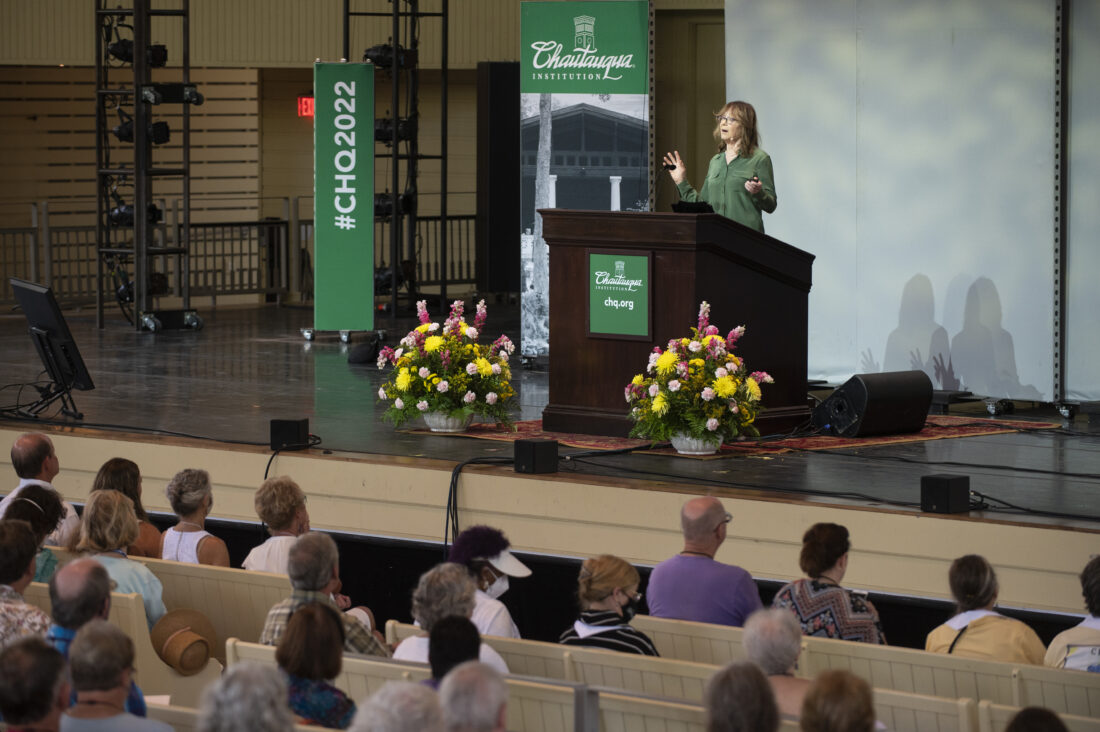Light and darkness not always at war, professor says

Maria Tatar, professor and children's literature, German literature, and folklore expert, speaks during Wednesday’s Morning Lecture on August 3, 2022 in the Amphitheater.
CHAUTAUQUA — People live by darkness and light.
“The words we speak, are saturated with metaphors drawn from the realms of light and dark,” said Maria Tatar, a professor.
For a long time, she told an Amphitheater audience Wednesday, as part of the theme “The World of Nighttime,” that she was afraid of the dark.
“And then one night, with the help of a flashlight that I swiped from my brother’s room, I made friends with the darkness,” Tatar noted, “and suddenly there was light. And yes, it was a little dim, but portals magically materialized.”
For years after that flashlight incident, Tatar entered dark forests with Hansel and Gretel, and went on many other journeys with other characters in other books. So, the light beam provided ignition power, and it furnished her imagination. For Tatar, it was a kind of rocket fuel. Letters in light banish her fear of the dark and of much else, she noted.
“So reading may require candles, light bulbs, and other sources of illumination,” Tatar said. “But storytelling paradoxically, at least oral storytelling, is an art that flourishes at night and in the dark.”
She said our primal fear of the darkness, a breeding ground for monsters, and for the bogeyman, can be managed by light.
“Light has become a conceptual metaphor for knowledge,” Tatar said. “The play of light and dark in our entertainment is what art historians call chiaroscuro — a technique that animates us. It creates melodrama and it keeps us hooked to our stories, and screens, (and) to visual storytelling.”
Tatar is the John L. Loeb Research Professor of Germanic Languages and Literatures and of Folklore and Mythology, Emerita, at Harvard University, where her research for four decades has focused on children’s literature, German literature, and folklore, according to assembly.chq.org.
She noted that people are both storytellers and interpreters, engaged in what her students like to call hermeneutics or the art of decoding and understanding. At night, she added, darkness and sleep all conspire to nourish the imagination, so when people wake up they are critics.
“Anthropologists tell us that many cultures forbids storytelling in the daytime. But once the sun sets, the moment comes for once upon a time, or other beginnings for stories,” she said.
Today, it’s a common practice to elevate storytelling with metaphors that reflect the social origins of the practice, she said.
So light and dark are not always at war, she said. Light and dark can also partner in kinship relationships, where each is invested with symbolic power. This strengthens rather than diminishes the opposite term, so light and dark support and need each other.
“So instead of framing the dialectic of light and dark in terms of good evil, innocence and sin, knowledge and ignorance, the concepts can be spring loaded with bidirectional energy, depending on each other for richer, more productive forms of cultural energy, she added.
The website also stated that she is a senior fellow of the Harvard Society of Fellows, with an exploration of the dual power of darkness and light in folklore and fairytales. Tatar is the author, editor and translator of numerous books on folklore and fairy tales, including The Hard Facts of the Grimms’ Fairy Tales; Off With Their Heads! Fairy Tales and the Culture of Childhood; The Annotated Classic Fairy Tales; The Annotated Brothers Grimm; The Annotated Hans Christian Andersen; Enchanted Hunters: The Power of Stories in Childhood; The Annotated Peter Pan; The Annotated African American Folktales (edited with her Harvard colleague Henry Louis Gates); The Fairest of Them All: Snow White and 21 Tales of Mothers and Daughters; and, most recently, The Heroine with 1001 Faces, published in 2021 by Liveright, an imprint of W.W. Norton — the home of many of Tatar’s edited and translated works.
She is also the author of Spellbound: Studies on Mesmerism and Literature and Lustmord: Sexual Murder in Weimar Germany. For her work, Tatar has received fellowships from the Guggenheim Foundation, the Radcliffe Institute for Advanced Studies, and the National Endowment for the Humanities. Tatar earned an undergraduate degree from Denison University and a doctoral degree from Princeton University. In 1971, after finishing her doctorate at Princeton University, Tatar joined the faculty of Harvard University, where she received tenure in 1978.



